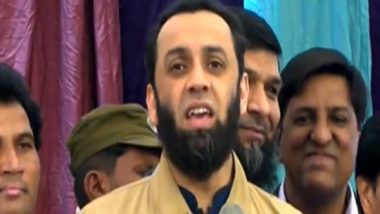Growing up, we had a Qari Sahab come and teach us the Quran, and he was unusually fond of Akbar Allahabadi. Apart from the passage you quoted, another of his favorites was:
تم شوق سے کالج میں پڑھو پارک میں پھولو
جائز ہے غباروں میں اڑو چرخ پر جھولو
لکین ایک سخن بندہ؛ عاجز کی رہے یاد
الله کو اور اپنی حقیقت کو نہ بھولو
The irony of course is that the poet himself studied at an English-language school, hence the extensive English vocabulary he employed to satirical effect, and was briefly employed as a clerk before rising through the ranks. I wonder if there is an element of self deprecation in his poetry.
The wit and satirical quality is reason enough to read the poetry of Akbar Allahabadi (1846-1921). His poetry, though, also says much about the times he lived in, as in fact the poem cited above indicates.
For many Muslims, particularly in upper India, the colonial challenge raised profound questions. What did it now mean to be Muslim? The sense of the world having been turned upside down, that sense of cultural decline, comes through strongly in some of Allahabadi’s poems.
Wo mutrab aur wo saaz wo gaana badal gaya
neendain badal gain wo fasana badal gaya
rang-i-rukh-i-bahaar ki zeenat hui nai
gulshan me bulbulon ka tarana badal gaya
Fitrat ke har asar mein howa aik inqlaab
Pani falak pe khait mein daana badal gaya
(the minstrel, the music, the song, sleep itself, the tales, the colours of spring, the tune of the nightingales in the flower garden have all changed. Every aspect of nature turned upside down; rain from the sky and the seed in the field no longer what it once was.)
In another he says that should you pass by his ruined village, you will see a soldiers' barracks belonging to the British standing next to a broken mosque:
Jo guzro gay idhar se mera ujra gaon dekho gay
Shikasta aik masjid hai bagal mein Gora Barrak hai
Cultural decline had happened before his eyes: the days of sherbet long gone. Instead these were the days of soda, lemonade, whiskey and tea:
Gaye sherbet ke din yaaron ke aage ab to ay Akbar
Kabhi soda kabhi lemonade kabhi whiskey kabhi tea hai
Muslims, of course, responded differently to the colonial challenge. One response was that of the modernists - Sayyid Ahmad Khan and the Aligarh movement - who attempted to adapt Islam to the needs of the modern world without surrendering its soul. But for many of its critics, including Allahabadi, they went too far. There was danger of reducing Islam to mere identity as he sarcastically noted:
Nai tahzib men diqqat ziyada to nahin hoti
Mazahib rahte hain qaaim faqat imaan jaata hai
(Not so troubling are these modern times / religions remain intact, only faith is lost)
In his attempts to reconcile religion with reason, in his fervent belief in science, Sayyid Ahmad Khan, so his many of critics thought, forgot that faith and belief is transcendent. Heart not reason, believing without seeing, were the essence of faith. Or as Allahabadi put it, rather more succinctly, God was beyond the limits of the telescope:
Khuda bahir hai haden dorbeen se
He felt that in falling over themselves to fill their bellies and please their western masters, these modern Muslims had little sense of self-worth. Though actually a nightingale, they were prepared to become parrots of the British so that they could have a council seat:
Haqiqat mein main hon bulbul magar charay ki khawahish mein
Bana hon member konsil yahan mithu mian ho kar
Though the British have kept their faith, the modernists in their attempts to ape the west have lost theirs:
Dars tha yaksaan magar wo to masihi he rahe
Tujh pe mazhab ke evaz shetan ka qaabu ho gaya
Aik he bottle se pee hotel mein dono ne sharaab
Lutf mastee un ko aaya or tu ullu ho gaya
(Attending the same lesson, the Christian kept his faith / but Satan captured yours / from one bottle you both drank the same wine in the hotel / he became intoxicated, you became a fool)
Finally, we note that unsurprisingly, given his sentiments above, Allahabadi was far more anti-colonial than many of the modernists he critiqued. In one couplet, he wrote there was not much difference between the colonial secret police and criminals:
Sheikh jee ke dono betay ba-hunar peda howay
Aik hain khufia police mein aik phansi pa gay
(Both sons of the Sheikh turned out rather skilled / One is in the secret police, the other sent to the gallows)
He warns Muslims to be wary of the British rulers. In a reference to the Christian belief in Trinity, he says,
Bachtay raho in ki teziyon se akbar
Tum kaya ho khuda ke teen tukray kar den
(Protect yourself from [British] sharpness, Akbar / What are you, when they cut God himself into three pieces).






 )
) 

